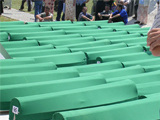 Genocide, mass graves, excavations, bags of bones, endless burials, denials despite the facts, politics and a general lack of humanity continue to characterize the annual 11 July Srebrenica memorial services, Anes Alic comments for ISN Security Watch.
Genocide, mass graves, excavations, bags of bones, endless burials, denials despite the facts, politics and a general lack of humanity continue to characterize the annual 11 July Srebrenica memorial services, Anes Alic comments for ISN Security Watch.
The bulk of news on Bosnia in the western media since the war has centered around the July 1995 genocide in Srebrenica – a story that has perhaps worn out its welcome in the press by now. And though one tries to avoid covering the same story every year, when the country commemorates what happened in Srebrenica and buries yet more remains excavated and identified from mass graves, there comes a point when one simply has to break down and ask why does this story never change.
What is most important to keep in mind is that Srebrenica today has sadly become largely a political tool, an excuse for ethno-nationalists on all sides to let loose their most radical sentiments and score points with their supporters.
The noteworthy incidents surrounding this year’s Srebrenica memorial service were many and varied, and perhaps indicative of what is proving to be the worst political crisis facing Bosnia since the war ended in 1995.
First, Judge Christoph Fluegge of the Hague-based International Criminal Tribunal for the former Yugoslavia (ICTY) told the German media that “genocide” is perhaps not an appropriate term to describe what happened in Srebrenica, rather “mass murder” is preferable.
Second, members of the Bosnian Serb radical Ravna Gora Chetnik movement lowered the Bosnia-Herzegovina flag from the municipality building in Bratunac, near Srebrenica, and desecrated it in the courtyard of a nearby restaurant, urinating on it and chanting: “This is Serbia.”
Third, Bosnian Serb officials refused to pay respect to the victims of Srebrenica, which was, in the end, no real surprise.
Fourth, a group of young Bosniaks (Bosnian Muslims) – who were participating in a peace march – burned a stack of hay and verbally assaulted and threatened a Bosnian Serb farmer near Srebrenica.
All of this, and a number of other similar incidents, marred the main goal of this year’s ceremony, which was to bury more than 500 bodies exhumed from the mass graves and bring closure to their families who have waited 14 long years for this moment.
And then there are the simple facts: After the fall of Srebrenica on 11 July 1995, up to 25,083 Bosnian Serbs – members of the police, army, paramilitary units, volunteers from Serbia – were involved in the mass murder of 8,074 Bosniak men and boys trying to reach the territory under the control of the Bosnian army. In late 1995, their bodies were found in nearly 100 mass graves and hundreds of individual graves. Several top wartime Bosnian Serb army, police and political leaders were convicted of “genocide” by the ICTY. In its ruling in 2007, the International Court of Justice (ICJ) said the Srebrenica massacre was an act of genocide committed by Bosnian Serbs. So, let’s just call a spade a spade.
So why then, every July, is there a debate among Bosnia’s nationalist politicians about what happened in Srebrenica?
Moreover, just ahead of this year’s Srebrenica memorial ceremony, the parliaments of Croatia and Montenegro adopted a resolution declaring 11 July an official day of remembrance for the victims of Srebrenica – a resolution that was first passed by the European Parliament in January, and which Brussels had urged all western Balkan nations to pass.
Bosnia itself failed to pass the resolution, though this was not unexpected as odd as it may seem, as the Bosnian Serbs in the government rejected the idea, saying that it failed to take into account Bosnian Serb victims of the war.
When asked whether he would attend the burial ceremony, Bosnian Serb member of the Bosnian Presidency Nebojsa Radmanovic, considered a fairly moderate politician, said he would not because “Srebrenica is deeply politicized.”
And certainly, he is right. After all, it wasn’t a political decision to conquer Srebrenica in the first place. It was a political decision to mobilize the Bosnian Serb army and police, and to cover up the killings afterwards. It is a political decision not to acknowledged that genocide took place, and to refuse to attend the ceremony in honor of the victims.
So, here we are, 14 years later, going over the same old lines, while the families of the victims of Srebrenica win nothing more than the moral high ground, which provides little in the way of closure. The local newspapers carried a story about one woman who buried a husband and one son this year, after having buried another son who had been earlier identified last year.
But, then, even closure is a tricky business. Even if Karadzic himself were to admit to the genocide and pay for his crimes, justice would not be served and the dead will not be brought back to life: Karadzic, after all, was not a lone wolf in this horror story and his legacy lives on.
And how is it that the rest of the world seems to be highly affected emotionally by what happened in Srebrenica, but here, in our own country, certain groups can shrug it off not as the massacre of thousands of human beings, but as a tool to be used in political games?
After all these years, there is still not a single high-profile political figure in this country – in any ethnic group – who is capable of humanity over politics, of country over career.
Source: isn.ethz.ch
 Eurasia Press & News
Eurasia Press & News


